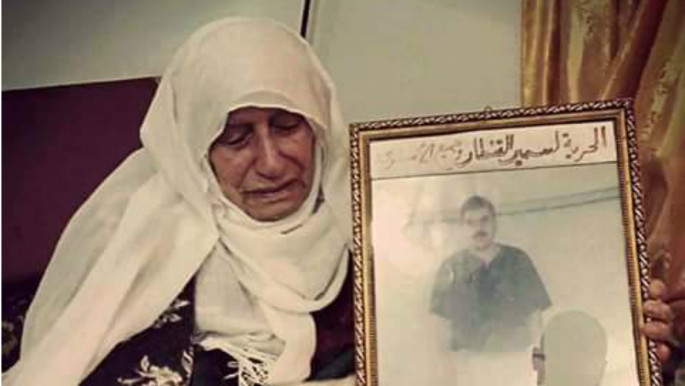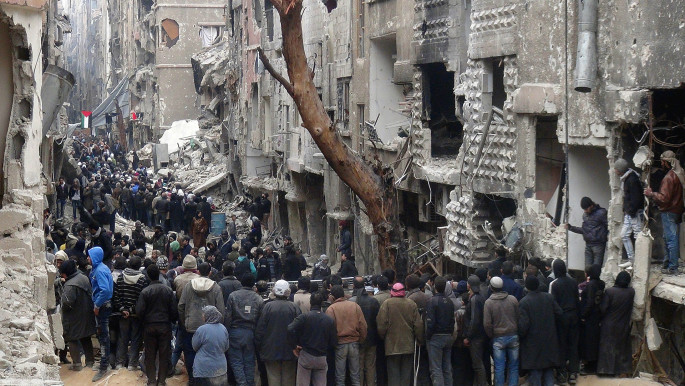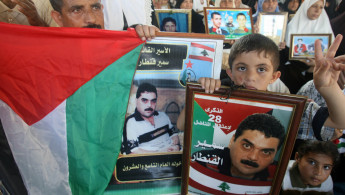Samir Kuntar: Defending the resistance, apologising for the regime
Samir Kuntar: Defending the resistance, apologising for the regime
The assassination of leading Hizballah figure Samir Kuntar has re-triggered debate on the Syrian regime and its declared support of Palestine.
7 min read
Samir Kuntar was once asked about Hizballah's siding with the Syrian regime.
"I do not care about Hizballah policy. I am Hizballah the resistance," he replied.
Yet Kuntar did deeply care about Hizballah's policy in Syria; he was not even a passive supporter and remained in Damascus as his ally. He actively supported the regime and advocated brutality against dissidents.
In 2011, as the Syria revolution burgeoned, he said that he would "cut off the hand" of any of those who dared to challenge the Assad regime.
His assassination by Israel on Saturday has since retriggered debate on Hizballah's intervention in the Syria war in 2011, and whether the group's - and Samir’s – history of resistance against Israel can excuse, or even explain it.
 |
He died while supporting one of the most notorious tyrants in human history Baraa Nezar Rayyan |
 |
Kuntar, especially, has a present role and history in fighting Israel before he was captured in 1979 after a failed operation with a Palestinian resistance group.
Therefore his death has especially stirred debate in Palestine, the country for which he declared he fought for.
The Islamist political party Hamas - who were previously supported by Damascus but relocated to Qatar after the outbreak of the revolution - issued a statement condemning his death as a "heinous crime" by Israel and dubbed him a martyr.
Prominent members and affiliates of Hamas took a slightly different stance, criticising Kuntar for his alliance with the Syrian regime.
Writing in al-Araby al-Jadeed, prominant Hamas affiliate Baraa Nezar Rayyan said that he was "saddened by Kuntar's death at the hands of Israel".
However, Rayyan wrote that what had saddened him more was that Kuntar had not "died in the face of the enemy, who imprisoned and tortured him, but had died while supporting one of the most notorious tyrants in human history".
Although many easily dismiss the rhetoric of the reactionary European left who defend Assad on the grounds of "resistance", some feel that more respect should be paid to those who sacrificed so much for Palestine.
"He spent thirty years in prison wasted from his life because he was fighting for Palestine… he started fighting for a Palestinian group… and Palestinians just forgot about him," said Hamoudi Abu Oula, a Palestinian from Ein Helwa refugee camp in South Lebanon.
"I support what he is doing in Syria, because he is protecting his allies who allowed him to fight against Israel."
However, his murder led to increased speculation about Israel's coordination with Assad's chief backer of Russia.
Following Israel's public acknowledgement of carrying out airstrikes against Hizballah in Syria earlier this month, Israeli military analysts said that it is likely Russia and Israel had agreed to cooperate in the realms of "information sharing".
Additionally, Kuntar's ex-wife weighed in on the debate. "He wasn't fighting Israel in Syria… he was fighting with Hizballah against the rebels and the Syrian people," she said.
She concluded that "the killer had been killed".
Information that has come to light since Kuntar's death would suggest that he was in Syria preparing to fight both Israel from the occupied Golan region, and also Syrian rebels in the area.
In Gaza, Kuntar is also remembered, and mourned by his "adopted mother" from Bureij refugee camp.
Known as Um Jabar Washah, she visited Kuntar in prison every week for fifteen years, as well as stopping in on other Palestinian prisoners.
Following his death many shared her picture of the elderly Um Washah mourning her son.

Daoud, a Gazan from the same camp who met Um Washah also mourns Qantar's death.
"I feel he is a good man… although he made mistakes," said Daoud. "Hamas shouldn't be saying bad things about him," he said.
Echoing many Palestinian's thoughts on Syria, Daoud said the situation was "complicated".
"I mean, if Ghassan Kanafani [a Marxist Palestinian novelist] was alive today… these [leftist] guys… would they support Bashar?" Daoud wondered aloud. He reflects a popular view that the Syrian regime is the last bastion of an independence, Arab nationalism, and secular government in the region.
Away from Hizballah and the Syrian regime's sect-based support, many of their defenders are leftists. Traditionally they have had a more antagonistic relationship with Damascus.
The Palestinian Left and Syria
Under the rule of Bashar al-Assad's father, Hafez al-Assad, Syria was allied to the right-wing phalangists in Lebanon’s civil war. They also opposed the Palestine Liberation Organisation on the other side. This led many to accuse them of complicity in the massacre and destruction of Tel al-Zaatar Palestinian refugee camp.
Socialist opposition politician Kamal Jumblatt in Lebanon was notably opposed to the Syrian regime and strongly supported the Palestine Liberation Organisation.
 |
You can't claim to support the just cause of Palestine and support a mass murderer in Syria who is killing Palestinians too Eyad Hamid, former resident of Yarmouk refugee camp |
 |
George Habash, leader of the Popular Front for the Liberation of Palestine [PFLP], accused Syria of collaborating with Israel to assassinate Jumblat in 1977.
"Down with the agents of the Syrian regime," he once yelled.
Leila Khaled, who hijacked three Israeli planes as a member of the PFLP also chastised the Syrian Baathist regime in her 1971 autobiography.
Reflecting critiques of many leftists at the time, Khlaed described Syrian Baathists as "insincere… successors to a dying Nasserism…" and "a regime of colonels".
Yet fast-forward to 2011, Khaled also stirred up debate about Syria in Palestine when she vocalised her support for the regime against "US imperialism".
Khaled was asked many questions about Yarmouk, which after being besieged by the regime has only 8,000 residents remaining in the camp from a pre-war high of 250,000.
She replied that opposition militants were predominantly responsible for Yarmouk's destruction.
Eyad Hamid, a Palestinian from Yarmouk refugee camp in Syria, is also critical of the opposition's activity in Yarmouk.
"There was an agreement in the camp to keep it 'arms free', but militants from neighbouring quarters didn't agree on that," he said. "Besides Yarmouk was supposed to be a protest free zone."

Hamid's family home was burnt down in the opposition's attacks on the camp in 2012. However, his objections to their actions didn't lead him to defend Assad.

Hamid's family home was burnt down in the opposition's attacks on the camp in 2012. However, his objections to their actions didn't lead him to defend Assad.
"Most of my family is displaced and my father has been in Assad's jails since August 2012."
Regarding Kuntar, Hamid concluded: "You can't claim to support the just cause of Palestine and support a mass murderer in Syria who is killing Palestinians, too."
Yet some feel that that issue of Palestine and Syria's supporters can be divided; one may laud Hizballah, Kuntar and Khaled for acts of resistance against Israel, whilst also disagreeing with her concerning the Syrian regime.
"It's crazy that people have become so blinded by the conflict that they start to celebrate an assassination by Zionists," said Khalil Hussein, a Palestinian activist.
Others agreed, saying that Israel did not carry out the strike thinking of "the blood of Syrian children" and that "Israel will always be our first enemy".
Similarly, Palestinian analyst Adnan Abu Amer simply remarked that Palestinians were too easily distracted" by "external events", much to the satisfaction of Israel.
However, as the Syrian people - if not the regime - have supported the Palestinian struggle, others feel that more should be done to pay attention to what the UN has deemed the "worst humanitarian crisis of our time."
 |
During the 2006 war with Israel, we hosted refugees from South Lebanon here in my city Syrian opposition supporter in Damascus |
 |
Abdelrahmen Shahb, a Palestinian from Gaza who was in prison with Kuntar, reported that as the Hizballah operative witnessed the destruction of Lebanon during the 2006 war, he "did not wish to be free".
He also said he also did not wish for any Lebanese, Syrian or "even an oppressed Jew" to be killed in those circumstances.
Now Syrians under bombardment also demand to be taken into consideration.
"We supported Hizballah before… during the 2006 war with Israel, we hosted refugees from South Lebanon here in my city… we welcomed them," said Mohammed, a Syrian activist in Damascus.
"But now they fight with Bashar, they have become our enemy," he added.
Many others feel that the cause of the Syrian revolution and Palestine are intimately connected through both their struggles against oppression, and seek to remind people - including Palestinians - that there is still a genuinely revolutionary movement in Syria that also seeks freedom.
In 2011, Hanin Ghadar wrote comparing Kuntar to Waem Amasha, another Syrian prisoner of Israel who was eventually freed.
"Kuntar wants to cut hands. Amasha wants to free Syria. Both were imprisoned in Israel, and both understand the meaning of freedom and dignity... but Kuntar chose to turn a blind eye," she said.
"Occupation and dictatorship are two faces of the same coin."


![President Pezeshkian has denounced Israel's attacks on Lebanon [Getty]](/sites/default/files/styles/image_684x385/public/2173482924.jpeg?h=a5f2f23a&itok=q3evVtko)



 Follow the Middle East's top stories in English at The New Arab on Google News
Follow the Middle East's top stories in English at The New Arab on Google News


